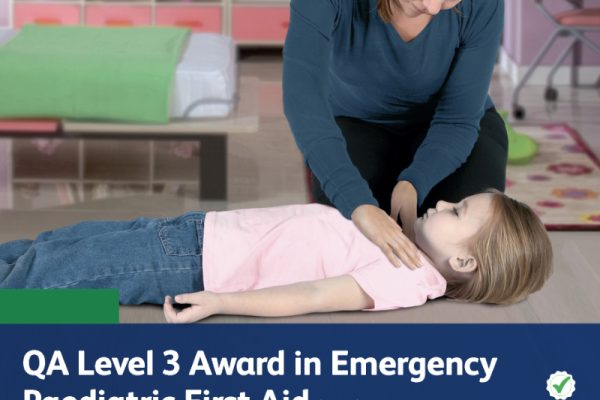Emergency Paediatric First Aid (RQF) QA Level 3 Award

Awarding Body:
Qualsafe Awards – Ofqual regulatedTraining course type:
On-site training and assessmentNovice training course duration:
1 dayNovice candidate numbers:
12Card options:
3-year Qualsafe traditional card & certificateMinimum age:
14Instructor:
Tuppco instructor
What is QA Level 3 Award in Emergency Paediatric First Aid (RQF)?
The QA Level 3 Award in Emergency Paediatric First Aid (RQF) qualification has been designed in-line with the current Early Years Foundation Stage (EYFS) requirements and is ideal for:
- Those who have gained a level 2 or 3 childcare qualification and have entered into an early years setting and wish to be included in the staff to child ratios to comply with the EYFS requirements.
- Anyone who cares for infants and children, such as parents, guardians, grandparents or those who have an involvement with infants and children and want to learn key paediatric first aid skills.
Successful candidates will learn the roles and responsibilities of the emergency paediatric first aider, and will be equipped with the skills needed to deal with a range of paediatric first aid situations, such as performing CPR and controlling external bleeding.
The objective of the qualification is to benefit Learners by preparing them to deal with a range of emergency first aid situations when looking after infants/children.
What does the training course include?
- The roles and responsibilities of an emergency paediatric first aider
- Assessing an emergency situation
- Dealing with an unresponsive infant or child
- Recovery Position
- CPR and defibrillation
- Choking
- Minor Injuries
- Bites and Stings
- Seizures
- External Bleeding
- Hypovolaemic shock
Venue and equipment requirements:
- Suitable and safe area to complete paperwork
- Suitable welfare facilities
- Suitable area for practical demonstrations
- Risk assessment completed
HSE further information:
- First aid at work
- https://www.hse.gov.uk/pubns/priced/l74.pdf
Theory assessment:
Theory assessment/multiple choice question papers
there is 1 paper per unit for each Learner and Learners should answer all the questions under ‘examination’ conditions.
Guidelines:
- The maximum time allowed is 25 minutes.
- The minimum mark is 11 out of 15 to be considered for an overall ‘Pass’.
Practical assessment criteria:
Practical assessments – observed by the Trainer throughout the course, with the results of each learning outcome recorded on the practical assessment paperwork.
There are 6 mandatory and 1 optional practical assessment for this qualification:
- Infant CPR and safe use of an AED
- Child CPR and safe use of an AED
- Choking casualty
- Paediatric wounds, bleeding, and shock
- Unconscious casualty
- Management of paediatric fractures
- Management of anaphylaxis
- Catastrophic bleeding (optional)
On-site training courses delivered:
Southwest – Gloucestershire, Wiltshire, Dorset, Devon, Cornwall, Avon, Somerset, Herefordshire, Monmouthshire
Southeast – Oxfordshire, Kent, Berkshire, Buckinghamshire, Hampshire, Surrey, Sussex, Middlesex
Midlands – Warwickshire, Worcestershire, Bedfordshire, Northamptonshire, Shropshire
East Anglia – Hertfordshire, Essex, Suffolk, Cambridgeshire, Norfolk
Aylesbury, Banbury, Basingstoke, Bath, Bedford, Birmingham, Brighton, Bristol, Cambridge, Cardiff, Cirencester, Cheltenham, Coventry, Exeter, Gloucester, Hereford, Hungerford, Milton Keynes, Newbury, Northampton, Oxford, Peterborough, Plymouth, Reading, Salisbury, Southampton, Stroud, Swindon, Taunton, Warwick, Winchester, Witney, Worcester, Yeovil


